Blogs
Should Women Control the Household Finance? ---Support from the Academia
Wed, 09/25/2013 - 15:22 — Xi Zhao
Should women control the household finance? This is a hot topic among most families around the world, as well as a debate at Science Forum and Tropentag 2013. Scholars from different countries provide varied facts in rural areas and put academic results into practices.
Jemimah Njuki from CARE highlighted women played an important role in food production, ensuring adequate food, diverse diets and quality of food to the whole household. In general, women as primary care givers influence child nutrition directly through improved childcare practices, or indirectly through improvements in their own nutrition. Early studies showed, increasing women’s control over assets, mainly land, physical and financial assets, had positive effects on a number of important development outcomes for the household, including food security, child nutrition, and education, as well as women’s own well-being (Quisumbing 2003, Smith 2003; world bank 2001). In Bangladesh, a higher share of women’s assets is associated with better health outcomes for girls (Hallman 2000).
Gordon Prain, a Senior Scientist at the International Potato Centre, gave his opinion at Tropentag 2013 based on his field research in Kenya. He stated, in the agriculture system women are very important in the cultivation. If women do the job, they should control the finance resource . If women can decide which crops to grow, it would be beneficial to the children´s nutrition and the whole family.
Stage Diving at the Closing Session
Wed, 09/25/2013 - 15:14 — Philipp Gassner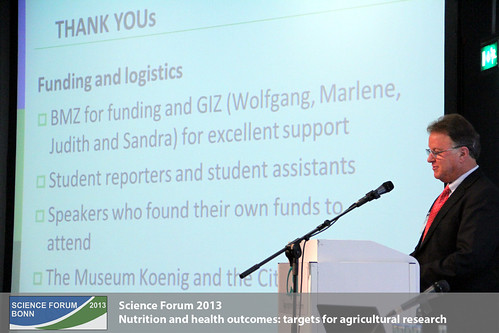 'I’ve learned more than I have contributed', Linxiu Zhang of the Chinese Academy of Agricultural Sciences nicely summarized before handing over to Ken Cassman, the ISPC Chair. Cassman didn’t intend to stage dive when he asked the about 150 participants of the Science Forum Closing Session to raise their hands. But the show of hands indicated the people present from both disciplines, agriculture and nutrition, whom the conference –quite successfully- aimed to bring to getter. And out of their ‘silos’.
Read more
'I’ve learned more than I have contributed', Linxiu Zhang of the Chinese Academy of Agricultural Sciences nicely summarized before handing over to Ken Cassman, the ISPC Chair. Cassman didn’t intend to stage dive when he asked the about 150 participants of the Science Forum Closing Session to raise their hands. But the show of hands indicated the people present from both disciplines, agriculture and nutrition, whom the conference –quite successfully- aimed to bring to getter. And out of their ‘silos’.
Read more
Student Assistants at Science Forum 2013
Wed, 09/25/2013 - 15:07 — Xi Zhao
When you arrived at the metro station for the Science Forum 2013 in Bonn, you will always be warmly welcomed by two or three young students. Therey are some of the 12 student assistants for the Science Forum, who will tell you where to go. They have many other little tasks, such as preparing the conferece materials, and manging electronic equipment. They have made an invaluable contribution to the success of the conference.
Find out that they are actually capable of answering more question than just the way to the restroom!
Tobias Gerhartsreiter, studying Geography as a master student at Wuerzburg University, is doing an internship at GIZ (Deutsche Gesellschaft fuer Internationale Zusammenarbeit). He is looking forward to improving skills for a future career at GIZ.
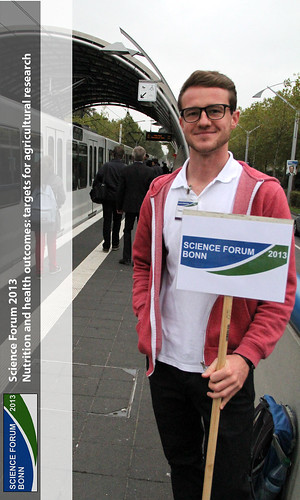 Vandasue Rodrigues, from Bangalore of India, is a master student in Plant Sciences at University of Bonn. She has been in Germany for two years. She enjoys meeting people from all of the world with different cultural backgrounds.
Vandasue Rodrigues, from Bangalore of India, is a master student in Plant Sciences at University of Bonn. She has been in Germany for two years. She enjoys meeting people from all of the world with different cultural backgrounds.

 Vandasue Rodrigues, from Bangalore of India, is a master student in Plant Sciences at University of Bonn. She has been in Germany for two years. She enjoys meeting people from all of the world with different cultural backgrounds.
Vandasue Rodrigues, from Bangalore of India, is a master student in Plant Sciences at University of Bonn. She has been in Germany for two years. She enjoys meeting people from all of the world with different cultural backgrounds.

How much biodiversity is on your plate?
Wed, 09/25/2013 - 13:23 — Paulina Campos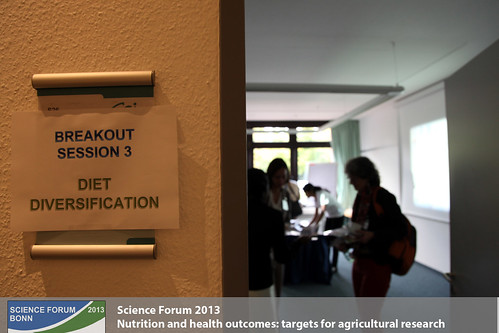 If the french writer and famous foodie Brillat-Savarin (1755-1826) would have been sitting among us at the breakout session about “Role of indigenous (forgotten) foods (plants and animals) in food diversification: what don’t we know?” he would be very dissapointed to see what we human kind has become. “Tell me what you eat and I’ll tell you who you are” wrote once Mr. Savarin. If we consider that from the 7.000 plant species and several thousand animal species used for human nutrition over the past 12.000 years, 98% of our modern diets relies only on 12 plant crops and 14 animal species, what would we answer if he asked us: who are you then now? A result of increasingly simplified diets which is the mirror of increasingly simplified agroecosystems.
If the french writer and famous foodie Brillat-Savarin (1755-1826) would have been sitting among us at the breakout session about “Role of indigenous (forgotten) foods (plants and animals) in food diversification: what don’t we know?” he would be very dissapointed to see what we human kind has become. “Tell me what you eat and I’ll tell you who you are” wrote once Mr. Savarin. If we consider that from the 7.000 plant species and several thousand animal species used for human nutrition over the past 12.000 years, 98% of our modern diets relies only on 12 plant crops and 14 animal species, what would we answer if he asked us: who are you then now? A result of increasingly simplified diets which is the mirror of increasingly simplified agroecosystems.
"The Silver Bullet" for the "The Cinderella Sector"
Wed, 09/25/2013 - 12:54 — Pamella Ogada
Food Safety- Breakout session
“More than one billion of the world population are hungry and more than two billion are sickened each year from the food they ate. Agriculture is exacting a heavy biological cost, but health policy and programs often stop at the clinic door.”
Food safety has for a longtime been ignored in the talks regarding food security, despite food borne diseases being considered the number one killer in the world. This has further been compromised as food security has been stretched based on the high demands. Furthermore, over the years little investments have been directed to this area.
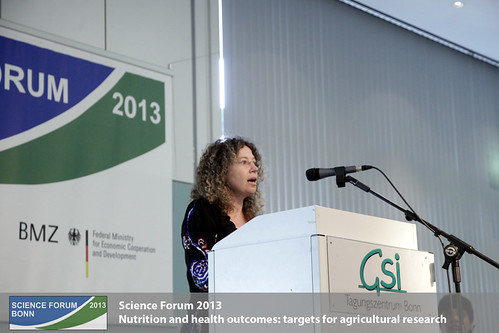 Delia Grace, International Livestock Research Institute (ILRI)
The suggested way to addressing food safety being from farm to folk, which includes the long chain from production to consumption, this includes; from harvesting, to the informal markets, to the storage, as well as areas of waste. Mycotoxins, which are very toxic fungus found in major crops and have been reported to contaminate over 25% of the world produce, are of great interest to researchers.
Delia Grace, International Livestock Research Institute (ILRI)
The suggested way to addressing food safety being from farm to folk, which includes the long chain from production to consumption, this includes; from harvesting, to the informal markets, to the storage, as well as areas of waste. Mycotoxins, which are very toxic fungus found in major crops and have been reported to contaminate over 25% of the world produce, are of great interest to researchers.
 Delia Grace, International Livestock Research Institute (ILRI)
The suggested way to addressing food safety being from farm to folk, which includes the long chain from production to consumption, this includes; from harvesting, to the informal markets, to the storage, as well as areas of waste. Mycotoxins, which are very toxic fungus found in major crops and have been reported to contaminate over 25% of the world produce, are of great interest to researchers.
Delia Grace, International Livestock Research Institute (ILRI)
The suggested way to addressing food safety being from farm to folk, which includes the long chain from production to consumption, this includes; from harvesting, to the informal markets, to the storage, as well as areas of waste. Mycotoxins, which are very toxic fungus found in major crops and have been reported to contaminate over 25% of the world produce, are of great interest to researchers.
Two Sexes Are Quite Inadequate
Wed, 09/25/2013 - 10:50 — Philipp Gassner
‘It would be a thousand pities if women wrote like men, or lived like men, or looked like men, for if two sexes are quite inadequate, considering the vastness and variety of the world, how should we manage with one only?’
Virginia Woolf is quite right, as was reflected in Breakout Session 7, 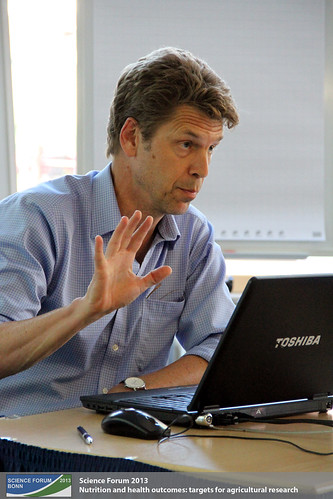 exploring links between nutrition, health and the female domains of subsistence farming. In the latter, inequality persists in unequal opportunities, low representation of women in leadership and in continuing violence against women in all its forms. Two out of three illiterate adults are women. Every 90 seconds, a woman dies in pregnancy. And even though the figure of women accounting for 80% of agricultural production, while owning less than 2% of land, is now contested, women clearly contribute to agriculture and nutrition quite differently than men.
Obviously, 'The playing field needs to be leveled'.
Read more
exploring links between nutrition, health and the female domains of subsistence farming. In the latter, inequality persists in unequal opportunities, low representation of women in leadership and in continuing violence against women in all its forms. Two out of three illiterate adults are women. Every 90 seconds, a woman dies in pregnancy. And even though the figure of women accounting for 80% of agricultural production, while owning less than 2% of land, is now contested, women clearly contribute to agriculture and nutrition quite differently than men.
Obviously, 'The playing field needs to be leveled'.
Read more
 exploring links between nutrition, health and the female domains of subsistence farming. In the latter, inequality persists in unequal opportunities, low representation of women in leadership and in continuing violence against women in all its forms. Two out of three illiterate adults are women. Every 90 seconds, a woman dies in pregnancy. And even though the figure of women accounting for 80% of agricultural production, while owning less than 2% of land, is now contested, women clearly contribute to agriculture and nutrition quite differently than men.
Obviously, 'The playing field needs to be leveled'.
Read more
exploring links between nutrition, health and the female domains of subsistence farming. In the latter, inequality persists in unequal opportunities, low representation of women in leadership and in continuing violence against women in all its forms. Two out of three illiterate adults are women. Every 90 seconds, a woman dies in pregnancy. And even though the figure of women accounting for 80% of agricultural production, while owning less than 2% of land, is now contested, women clearly contribute to agriculture and nutrition quite differently than men.
Obviously, 'The playing field needs to be leveled'.
Read more
Humans, we have a problem
Tue, 09/24/2013 - 23:16 — Eva Hilt
What Germans are supposed to know about the Science Forum: insights from the press conference with Joachim von Braun, head of the Centre for development research and Holger Baum, head of 'MediaCompany'.
AT A GLANCE!! - Science Forum 2013
Tue, 09/24/2013 - 17:50 — Pamella Ogada
"Agricultural research and nutrition go hand in hand with regards to food security." This was the opening remark for the Science Forum 2013. With that, key factors in research regarding major crops like maize and rice, and the requirement of genetic research, need to be put in place. The innovative transfers of research findings is very essential especially to the farm levels; through networking and partnership, exchange is promoted among international agricultural centres, institutes and scientists.
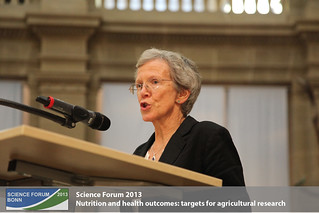 Maggie Gill, ISPC Council Member and Science Forum 2013 Chair
Funding bodies allocate funds for agricultural research institution in partner countries, with the role for its member organizations being to support European agricultural research and development to promote knowledge transfers. This would contribute to success of international agriculture research for development. System level-objectives of these funding bodies include reformation which focuses on reducing rural poverty, improving food security in terms of quantity, quality and affordability, improving nutrition and health, and a sustainable management of environment and natural resources.
Maggie Gill, ISPC Council Member and Science Forum 2013 Chair
Funding bodies allocate funds for agricultural research institution in partner countries, with the role for its member organizations being to support European agricultural research and development to promote knowledge transfers. This would contribute to success of international agriculture research for development. System level-objectives of these funding bodies include reformation which focuses on reducing rural poverty, improving food security in terms of quantity, quality and affordability, improving nutrition and health, and a sustainable management of environment and natural resources.
 Maggie Gill, ISPC Council Member and Science Forum 2013 Chair
Funding bodies allocate funds for agricultural research institution in partner countries, with the role for its member organizations being to support European agricultural research and development to promote knowledge transfers. This would contribute to success of international agriculture research for development. System level-objectives of these funding bodies include reformation which focuses on reducing rural poverty, improving food security in terms of quantity, quality and affordability, improving nutrition and health, and a sustainable management of environment and natural resources.
Maggie Gill, ISPC Council Member and Science Forum 2013 Chair
Funding bodies allocate funds for agricultural research institution in partner countries, with the role for its member organizations being to support European agricultural research and development to promote knowledge transfers. This would contribute to success of international agriculture research for development. System level-objectives of these funding bodies include reformation which focuses on reducing rural poverty, improving food security in terms of quantity, quality and affordability, improving nutrition and health, and a sustainable management of environment and natural resources.




